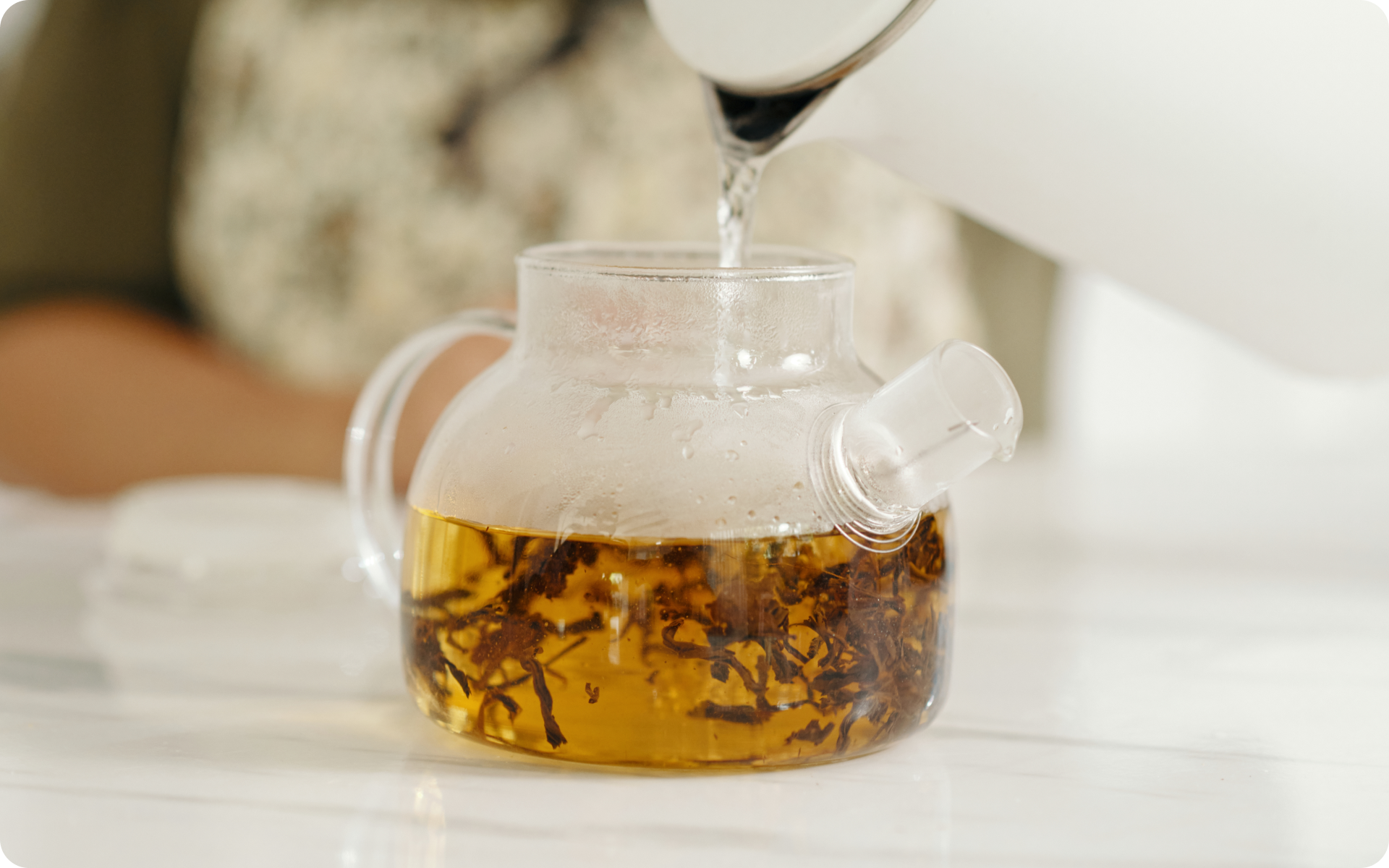80% of adults in the United States consume caffeine every day according to the CDC (1). Caffeine is present in many drinks, such as coffee, tea, energy drinks, and soda. For many, a cup of coffee is the go-to solution for a morning boost or an afternoon slump.
While consuming caffeine may have its perks, too much of it may have negative effects on your health, depending on preexisting conditions and the amount of caffeine consumed (2).
What counts as too much, you may ask? Well, the recommended daily intake of caffeine is up to 400 mg for adults (2). To put that in perspective, an 8 fluid oz cup of coffee contains close to 100 mg of caffeine (3).
Quitting caffeine completely may not be necessary or even possible for everyone. In fact, research suggests that moderate caffeine consumption may help people with specific diagnoses, such as asthma or Parkinson’s disease, thanks to its healing properties (2).
For some people, reducing caffeine intake may have significant benefits for health and well-being.
Here are 7 benefits of quitting caffeine and what you can drink instead:
Is Quitting Caffeine Good For You?
If you’ve been drinking more than the recommended daily intake of caffeine or have been experiencing negative effects from consuming it, quitting or reducing your intake may have numerous benefits. These include but are not limited to:
1. Improved Sleep Quality
Many people underestimate the impact caffeine has on their nighttime rest. Caffeine has a half-life of about five hours, meaning that it takes this long for half of the caffeine in your system to be eliminated (4). If you consume a cup of coffee later in the day, even just after lunch, it can linger in your body, affecting your ability to unwind and fall asleep at night.
Research shows that caffeine can interfere with your body’s natural sleep-wake cycle, or circadian rhythm. It blocks the action of adenosine, a neurotransmitter that promotes sleep, leading to increased alertness when you don’t necessarily need it (5).
Studies have found that people who consume caffeine regularly may experience reduced total sleep time and sleep disturbances (6).
When you stop consuming caffeine, you may allow your body to recalibrate its internal clock. Many former caffeine drinkers have anecdotally reported falling asleep faster, enjoying deeper sleep, and waking up feeling more refreshed.
2. Reduced Anxiety Levels
Caffeine is a stimulant, and it works by blocking adenosine receptors in the brain (2). Normally, adenosine promotes relaxation and sleepiness (7). By blocking its effects, caffeine can make you feel more alert and focused. However, in people who are prone to anxiety, this effect may have the opposite effect.
Research has shown that there’s a direct correlation between caffeine intake and increased anxiety. More specifically, a meta analysis published in Frontiers in Psychology found that higher caffeine consumption is associated with more severe anxiety disorders. Individuals who consume 400 mg or more of caffeine daily are at a higher risk of experiencing anxiety symptoms (8).
When you quit caffeine, your body may start to recalibrate. Without the jolt of caffeine pushing your adrenal glands into overdrive, you may find that your baseline anxiety levels begin to lower. Many people have anecdotally reported feeling calmer and more centered once they have removed caffeine from their diets.
BetterMe is your fast-track ticket to long-lasting weight loss! Tailor your fitness journey and maximize your results with just a couple of swipes!
3. Enhanced Digestive Health
For many, a morning cup of coffee may seem like a quick way to get things moving — but it’s not without its downsides. Caffeine stimulates the production of stomach acid, which may lead to digestive discomfort for some individuals (9).
Excessive caffeine consumption may even exacerbate conditions like acid reflux and Irritable Bowel Syndrome (IBS) (9) (10).
When you consume caffeine, it triggers the release of gastrin, a hormone that increases stomach acid production. This can lead to increased acidity in the stomach, and for those already struggling with digestive disorders, caffeine can intensify symptoms (9).
Taking a break from caffeine may let your digestive system find its natural rhythm again. Without the added stimulation from caffeine, you may find that your stomach feels more “settled” and less bloated.
4. Better Dental Health
Caffeine may be a surprising contributor to dental problems. Many caffeinated beverages, particularly coffee, tea and soda, are not only acidic but also can stain teeth over time (11).
While the occasional cup of coffee is unlikely to damage your enamel, consistent overconsumption can lead to wear and tear. The acidity of these drinks further exacerbates the risk of tooth erosion, leaving you vulnerable to cavities and sensitivity (11).
Research has shown that acidic and carbonated drinks can lower the pH balance in the mouth, making it easier for harmful bacteria to thrive. (12)
According to a study published in PLOS Journal, frequent consumption of acidic beverages can significantly increase the likelihood of dental erosion and decay and the degree of erosivity caused by different drinks varies (13).
When you quit caffeine, or at least reduce your intake, you may not just boost your overall health; you might also potentially protect your oral health from further damage.
5. Improved Hormonal Balance for Women
Consuming too much caffeine may affect women’s hormonal health. Research suggests that caffeine can decrease the production of estradiol, the most potent estrogen in the female body hormone (14). Estrogen plays a key role in menstruation, pregnancy and bone health (15).
Additionally, caffeine consumption during pregnancy has been linked to low birth weight and increased risk of miscarriage (16) (17). It’s recommended that women limit their caffeine intake to 200mg or less per day while pregnant (18).
Quitting or reducing caffeine intake may help regulate your hormonal balance with all the associated health benefits that this may bring.
Read more: Is Mushroom Coffee Everything It Promises?
6. Reduced Risk of Cardiovascular Issues
Caffeine is a stimulant that increases heart rate and blood pressure. While this effect may be beneficial in small doses, excessive caffeine consumption may put unnecessary strain on the cardiovascular system (19).
People with underlying heart conditions or high blood pressure are more susceptible to adverse effects from consuming too much caffeine, according to research (19).
Research has shown that quitting caffeine can lead to a decrease in both resting heart rate and blood pressure levels (19). This reduction may lower one’s risk of developing cardiovascular diseases such as hypertension.
7. Financial Savings
Let’s face it – caffeine isn’t cheap. Whether you’re buying coffee from a shop or making it at home, those daily cups can add up quickly.
By quitting caffeine, you can save a significant amount of money in the long run. You may also find that your energy levels and productivity increase, allowing you to focus on other aspects of your life, without relying on caffeine.
Will I Be Happier If I Quit Caffeine?
If caffeine consumption has negative side effects, then quitting or reducing your intake may lead to an overall increase in physical and emotional well-being. However, if you enjoy caffeine and it doesn’t negatively affect you, there’s no need to quit.
Moderation is key; consuming small amounts of caffeine can still provide some benefits without causing any major issues.
It’s important to listen to your body and make informed decisions about your caffeine consumption, based on how it affects you personally. Additionally, it is important to consult with your healthcare provider to make sure that your caffeine consumption meets your individual health needs.
If you do decide to quit or reduce your intake, be prepared for potential withdrawal symptoms such as headaches and fatigue (20). These should pass within a few days as your body adjusts. If these symptoms do not subside, please contact your healthcare provider for more guidance.
If you’ve mustered up the courage to crush your weight loss goal, let BetterMe take the sting out of this demanding process. Our app will help you restructure your habits, remold your life and crank up your fitness results!
How Long Does It Take To Detox From Caffeine?
The side effects of caffeine withdrawal can vary from person to person, and the timeline for detoxing will also differ. Generally, symptoms may last anywhere from 2-9 days, with the most intense effects occurring within the first 20-51 hours (20). After this initial period, your body should start to adjust to lower levels of caffeine and alleviate any discomfort.
It’s essential to stay hydrated and get enough rest during this time as your body works to rid itself of excess caffeine. It’s okay to slowly reduce your intake, instead of going cold turkey if that feels more manageable for you. This depends on your unique health needs.
What Are Some Signs You Should Stop Drinking Coffee?
Some signs that you should stop drinking coffee include but are not limited to (2):
- Heartburn, acid reflux, or other digestive issues after consuming caffeine: these may indicate that caffeine may be causing irritation in your stomach and reducing or quitting it could provide relief.
- Trouble sleeping or difficulty falling asleep: caffeine may disrupt sleep patterns, leading to fatigue and other issues. If you find yourself struggling to get a good night’s rest it may be time to cut back.
- Anxiety, jitters, or panic attacks after consuming caffeine: these are common side effects of excessive caffeine intake and may be signs that you should reduce or eliminate caffeine from your diet.
- Issues with your teeth, such as tooth decay or sensitivity: these could be signs that the acidity of caffeine is damaging your enamel and causing tooth erosion.
If you experience any of these symptoms, it may be worth considering cutting back on caffeine or quitting altogether. Consult with your doctor if you have any concerns about how caffeine may be affecting your health and if you are having any of the aforementioned health issues.
Read more: Should You Use Fat Burning Coffee For Weight Loss?
What Should You Drink Instead of Coffee?
If you’re looking to cut back on caffeine, here are some alternatives to consider:
1. Chicory “Coffee”
Chicory coffee is made from the roasted roots of the chicory plant, offering a caffeine-free alternative that closely resembles the taste of traditional coffee. It contains inulin, a type of soluble fiber that can be beneficial to gut health by promoting the growth of good bacteria (21).
To prepare chicory coffee, simply roast chicory roots until they are dark brown, then grind them into a coarse powder. Brew as you would regular coffee, using about 1 tablespoon of the ground chicory per cup of water.
Some studies have suggested that chicory may help reduce inflammation and improve liver health (22), but those with allergies to ragweed or related plants should exercise caution as chicory can exacerbate allergic reactions (23).
2. Yerba Mate
Yerba mate is a traditional South American drink made from the leaves of the Ilex paraguariensis plant. While it does contain a substance similar to caffeine, it is lower in content compared to coffee, making it a suitable alternative for those looking to reduce caffeine intake.
Packed with vitamins, minerals, and antioxidants, yerba mate is known to improve mental clarity and physical performance (24).
To prepare yerba mate, steep the dried leaves in hot, but not boiling, water—ideally around 140°F to 158°F (60-70°C)—for about 5 minutes, and enjoy it with a bombilla (a special straw) or in a mug.
Keep in mind that excessive consumption of yerba mate might be linked to certain health risks, including an increased risk of certain cancers, potentially related to the high temperatures at which it is often consumed (25). Moderation is key, so limiting intake to a few cups a day is advisable.
3. Mushroom Elixir
Mushroom elixirs are a unique blend of medicinal mushrooms, typically featuring varieties like reishi, chaga, or lion’s mane. These mushrooms are renowned for their potential health benefits, which may include boosting the immune system, enhancing cognitive function, and reducing stress (26).
To prepare a simple mushroom elixir, you can mix powdered mushroom blends with hot water or milk, adding sweeteners like honey or maple syrup if desired.
While these mushrooms are generally safe, be cautious if you’re taking certain medications, as they can interact with blood thinners or immunosuppressants.
4. Golden Milk
Golden milk, also known as turmeric latte, is a warm beverage made from turmeric, a spice known for its anti-inflammatory properties (27).
The primary ingredients include milk (dairy or plant-based), turmeric, black pepper (to enhance the absorption of curcumin—the active compound in turmeric (28), and sweeteners like honey or agave.
This comforting drink can be prepared by heating milk and whisking in the turmeric and black pepper until smooth.
With its potential to support joint health and digestion, golden milk can be a soothing choice, especially before bedtime. However, anyone who is pregnant or has liver issues should discuss turmeric consumption with a doctor, as high doses might not be advisable (27).
5. Chia Seed Water
Chia seed water is a refreshing and nutritious drink made by soaking chia seeds in water. These tiny seeds are packed with omega-3 fatty acids, fiber, protein, and various essential minerals, making them a great addition to your hydration routine (29).
To prepare chia seed water, simply mix 1-2 tablespoons of chia seeds in a glass of water and let them soak for about 30 minutes until they expand and create a gel-like consistency. You can add lemon juice, fruit slices, or honey for flavor.
Keep in mind that while chia seeds are safe for most people, they can absorb a lot of water; therefore, it’s essential to stay hydrated to avoid any digestion issues.
If you have a history of esophageal problems or digestive disorders, make sure to check with a healthcare professional before trying them.
FAQs
Will My Skin Look Better If I Stop Drinking Coffee?
Your skin may look better if you stop drinking coffee, particularly if it was causing dehydration or exacerbating conditions like acne. However, everyone is different, and cutting out caffeine alone may not affect your skin in a noticeable way.
A balanced diet and a skincare routine that is tailored to one’s individual skin needs may also be helpful in achieving healthy-looking skin (30).
Is It Good To Cycle Off Caffeine?
Cycling off caffeine (taking breaks from consuming it) may have some potential benefits, such as reducing tolerance and dependency. However, if done too frequently or for extended periods, it may also lead to withdrawal symptoms and decreased energy levels. It’s always a good practice to listen to your body to find what works best for you.
Is Decaf Coffee Completely Caffeine-Free?
Decaf coffee is not completely caffeine-free; it still contains trace amounts of caffeine. On average, a 8-fluid ounce cup of decaf coffee contains about 2.4 mg of caffeine (31), compared to 96 mg found in regular coffee (3).
While this amount may be negligible for most people, it’s important for those who are highly sensitive to caffeine or trying to eliminate it completely from their diet, to take note.
With this in mind, if you’re looking for a truly caffeine-free alternative, herbal teas or caffeine-free alternatives like chicory may be a better option.
How Can I Reduce My Caffeine Intake Without Giving Up Coffee Altogether?
If you want to reduce your caffeine intake without giving up coffee altogether, there are several options you can try:
- Gradually decrease the amount of coffee you drink each day until you reach your desired level.
- Experiment with alternative brewing methods that may extract less caffeine from the beans (such as cold brew or pour-over).
- Try mixing caffeinated and decaf coffee to gradually decrease your caffeine intake.
- Substitute some of your coffee drinks with herbal teas or other alternatives.
The Bottom Line
While caffeine may have its benefits, it’s essential to be mindful of how much we consume. Quitting or reducing our intake may lead to improved sleep quality, reduced anxiety levels, better digestive health, improved dental health, hormonal balance for women, and a lower risk of cardiovascular issues.
Not only do these changes benefit our overall health and wellbeing, but they can also save us money in the long run. The next time you reach for that cup of coffee or tea, consider whether it’s truly necessary, and if quitting or reducing your caffeine intake may have positive effects on your mind and body.
Please consult with your healthcare provider before making any drastic lifestyle changes.
DISCLAIMER:
This article is intended for general informational purposes only and does not serve to address individual circumstances. It is not a substitute for professional advice or help and should not be relied on for making any kind of decision-making. Any action taken as a direct or indirect result of the information in this article is entirely at your own risk and is your sole responsibility.
BetterMe, its content staff, and its medical advisors accept no responsibility for inaccuracies, errors, misstatements, inconsistencies, or omissions and specifically disclaim any liability, loss or risk, personal, professional or otherwise, which may be incurred as a consequence, directly or indirectly, of the use and/or application of any content.
You should always seek the advice of your physician or other qualified health provider with any questions you may have regarding a medical condition or your specific situation. Never disregard professional medical advice or delay seeking it because of BetterMe content. If you suspect or think you may have a medical emergency, call your doctor.
SOURCES
- Caffeine & Long Work Hours (n.d., cdc.gov)
- Caffeine as a Factor Influencing the Functioning of the Human Body—Friend or Foe? (2021, ncbi.nlm.nih.gov)
- Coffee, brewed (2022, fdc.nal.usda.gov)
- Pharmacology of Caffeine – Caffeine for the Sustainment of Mental Task Performance (2001, ncbi.nlm.nih.gov)
- Adenosine, caffeine, and sleep–wake regulation: state of the science and perspectives (2020, onlinelibrary.wiley.com)
- The effect of caffeine on subsequent sleep: A systematic review and meta-analysis (2023. sciencedirect.com)
- Sleep Homeostasis, Metabolism, and Adenosine (2015, link.springer.com)
- Caffeine intake and anxiety: a meta-analysis (2024, frontiersin.org)
- Effects of Coffee on the Gastro-Intestinal Tract: A Narrative Review and Literature Update (2022, ncbi.nlm.nih.gov)
- Association of Coffee and Caffeine Intake With Irritable Bowel Syndrome in Adults (2021, frontiersin.org)
- The brewed connection: A comprehensive review of the relationship between caffeine and oral health (2023, researchgate.net)
- Effects of Carbonated Beverage Consumption on Oral pH and Bacterial Proliferation in Adolescents: A Randomized Crossover Clinical Trial (2022, ncbi.nlm.nih.gov)
- Influence of Various Acidic Beverages on Tooth Erosion. Evaluation by a New Method (2015, journals.plos.org)
- Caffeinated beverage intake and reproductive hormones among premenopausal women in the BioCycle Study (2012, sciencedirect.com)
- Estrogen (2023, ncbi.nlm.nih.gov)
- Maternal caffeine intake during pregnancy is associated with risk of low birth weight: a systematic review and dose-response meta-analysis (2014, biomedcentral.com)
- Maternal caffeine intake during pregnancy and risk of pregnancy loss: a categorical and dose–response meta-analysis of prospective studies (2015, ncbi.nlm.nih.gov)
- How much coffee can I drink while I’m pregnant? (2020, acog.org)
- Caffeine Effects on the Cardiovascular System – Caffeine in Food and Dietary Supplements: Examining Safety (2014, ncbi.nlm.nih.gov)
- Caffeine Withdrawal (2023, ncbi.nlm.nih.gov)
- Back to the Roots: Revisiting the Use of the Fiber-Rich Cichorium intybus L. Taproots (2020, sciencedirect.com)
- Health Benefits of Key Constituents in Cichorium intybus L. (2023, ncbi.nlm.nih.gov)
- CHICORY: Overview, Uses, Side Effects, Precautions, Interactions, Dosing and Reviews (n.d., webmd.com)
- Yerba Mate—A Long but Current History (2021, ncbi.nlm.nih.gov)
- Maté consumption association with upper aerodigestive tract cancers: A systematic review and meta-analysis (2018, sciencedirect.com)
- Medicinal Mushrooms: Their Bioactive Components, Nutritional Value and Application in Functional Food Production—A Review (2015, ncbi.nlm.nih.gov)
- Turmeric and Its Major Compound Curcumin on Health: Bioactive Effects and Safety Profiles for Food, Pharmaceutical, Biotechnological and Medicinal Applications (2020, frontiersin.org)
- Curcumin: A Review of Its’ Effects on Human Health (2017, ncbi.nlm.nih.gov)
- Nutritional and therapeutic perspectives of Chia (Salvia hispanica L.): a review (2015, ncbi.nlm.nih.gov)
- Enhancing Skin Anti-Aging through Healthy Lifestyle Factors (2023, mdpi.com)
- Coffee, brewed, decaffeinated (2022, fdc.nal.usda.gov)











